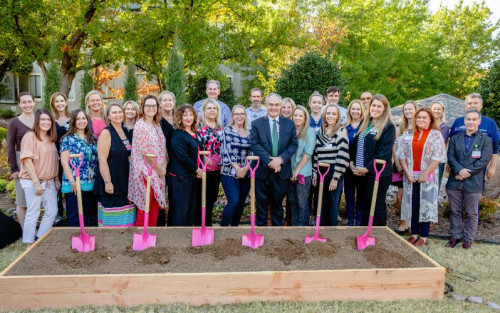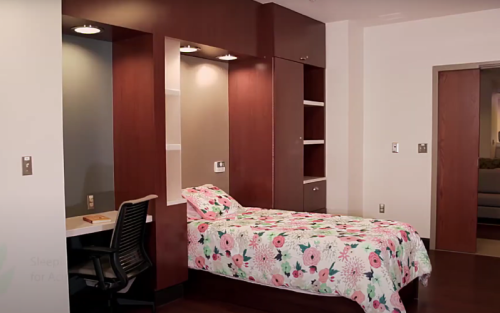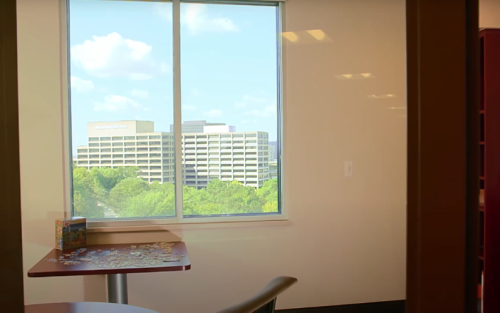






Laureate Eating Disorder Program
Treatment Focus
You can get treatment for eating disorders at this center, helping you navigate symptoms, build coping tools, and restore your physical health under expert care.
Primary Level of Care
Offering intensive care with 24/7 monitoring, residential treatment is typically 30 days and can cover multiple levels of care. Length can range from 14 to 90 days typically.
This provider hasn't verified their profile's information. Are you the owner of this center? Claim your listing to better manage your presence on Recovery.com.
Treatment Focus
You can get treatment for eating disorders at this center, helping you navigate symptoms, build coping tools, and restore your physical health under expert care.
Primary Level of Care
Offering intensive care with 24/7 monitoring, residential treatment is typically 30 days and can cover multiple levels of care. Length can range from 14 to 90 days typically.
Provider's Policy
Saint Francis Health System entities participate in many PPO and HMO plans. Major credit cards are also accepted.
Laureate Eating Disorder Program
Laureate Eating Disorder Program
About Laureate Eating Disorder Program
Located on 47 acres of rolling hills in Tulsa, Oklahoma, Laureate Eating Disorders Program treats anorexia nervosa, bulimia nervosa, and other eating disorders and adolescent and adult women. Their detox, residential, day, and intensive outpatient (IOP) treatments include cognitive behavioral therapy (CBT), dialectical behavioral therapy (DBT), art therapy, eye movement desensitization and reprocessing (EMDR), family counseling, and group therapy. Adolescents and adults participate in separate groups. Laureate conducts individual therapy twice a week and family therapy once a week. Laureate's therapists and dietitians focus on stress that causes eating disorders. A client spends up to 8 hours a day with their therapist, who tracks when the client meets a healthy weight range and has a maintainable diet and exercise plan. Clients can choose to participate in cooking classes and off-campus excursions.
The Laureate Eating Disorders Program is part of Laureate Psychiatric Clinic and Hospital. The eating disorders program is different from the main program on the same campus, which also treats men.
Their culinary staff have experience preparing meals that accommodate clients' dietary preferences, especially kosher and halal meals.
As part of Saint Francis Health System, a Catholic hospital system, Laureate Eating Disorders Program uses MyChart to display treatment progress to patients during and after care.
Insurances that Laureate accepts include Aetna Behavioral, Aetna Better Health Sooner Select, BCBS, Beacon, BlueAdvantage, BlueLincs, BluePreferred, Cigna, Cigna Behavioral, Community Care HMO, Community Care PPO, Community Care Senior, First Health, Healthcare Highways, Healthcare Solutions Group, HealthChoice, Humana, Healthy Horizons Sooner Select, Medicaid, Medicare, MHN, NativeBlue, Oklahoma Complete Health Sooner Select, Oklahoma Health Network, Optum Behavioral/United Behavioral, PHCS, Preferred Community Choice, QuikTrip, United Medicare Advantage, and United Dual Complete.

Center Overview
Treatment Focus
You can get treatment for eating disorders at this center, helping you navigate symptoms, build coping tools, and restore your physical health under expert care.
Joint Commission Accredited
The Joint Commission accreditation is a voluntary, objective process that evaluates and accredits healthcare organizations (like treatment centers) based on performance standards designed to improve quality and safety for patients. To be accredited means the treatment center has been found to meet the Commission's standards for quality and safety in patient care.

Insurance Accepted
Cash Pay Rates
Estimated Cash Pay Rate
Center pricing can vary based on program and length of stay. Contact the center for more information. Recovery.com strives for price transparency so you can make an informed decision.
Levels of Care



Your Care Options
Specializations
Adolescents
Teens receive the treatment they need for mental health disorders and addiction, with the added support of educational and vocational services.
Christian
Through surrender and commitment to Christ, patients refocus the efforts and source of their recovery with clinical and spiritual care.
Who We Treat
Adolescents
Teens receive the treatment they need for mental health disorders and addiction, with the added support of educational and vocational services.
Women only
Women attend treatment in a gender-specific facility, with treatment delivered in a safe, nourishing, and supportive environment for greater comfort.
Approaches
Evidence-Based
A combination of scientifically rooted therapies and treatments make up evidence-based care, defined by their measured and proven results.
Individual Treatment
Individual care meets the needs of each patient, using personalized treatment to provide them the most relevant care and greatest chance of success.
Christian
Through surrender and commitment to Christ, patients refocus the efforts and source of their recovery with clinical and spiritual care.
Medical
Medical addiction treatment uses approved medications to manage withdrawals and cravings, and to treat contributing mental health conditions.
Therapies
1-on-1 Counseling
Patient and therapist meet 1-on-1 to work through difficult emotions and behavioral challenges in a personal, private setting.
Art Therapy
Visual art invites patients to examine the emotions within their work, focusing on the process of creativity and its gentle therapeutic power.
Eye Movement Therapy (EMDR)
Lateral, guided eye movements help reduce the emotional reactions of retelling and reprocessing trauma, allowing intense feelings to dissipate.
Family Therapy
Family therapy addresses group dynamics within a family system, with a focus on improving communication and interrupting unhealthy relationship patterns.
Nutrition Counseling
Nutritious food helps patients heal from within, setting them up for mental and bodily wellness as they learn about healthy eating.
Conditions We Treat
Eating Disorders
An eating disorder is a long-term pattern of unhealthy behavior relating to food. Most people with eating disorders have a distorted self-image.
Languages
Care Designed for Your Needs
Personal Amenities
Amenities
Special Considerations
Gender-specific groups
Patients in gender-specific groups gain the opportunity to discuss challenges unique to their gender in a comfortable, safe setting conducive to healing.
Religion-Based Track
Patients can join faith-based recovery tracks to approach recovery with others in their faith, healing in a like-minded group with similar goals.
Activities

What people are saying
Treatment
2.9
Accommodations
2.4
Food & Nutrition
2.2
Value
2.6
N
Reviewed 06/01/24
Review from Rehabs.com
annomous
Reviewed 05/07/24
Review from Rehabs.com
AMS
Reviewed 09/30/16
Review from Rehabs.com
Catherine
Reviewed 03/09/16
Review from Rehabs.com
Anonymous
Reviewed 02/29/16
Review from Rehabs.com





